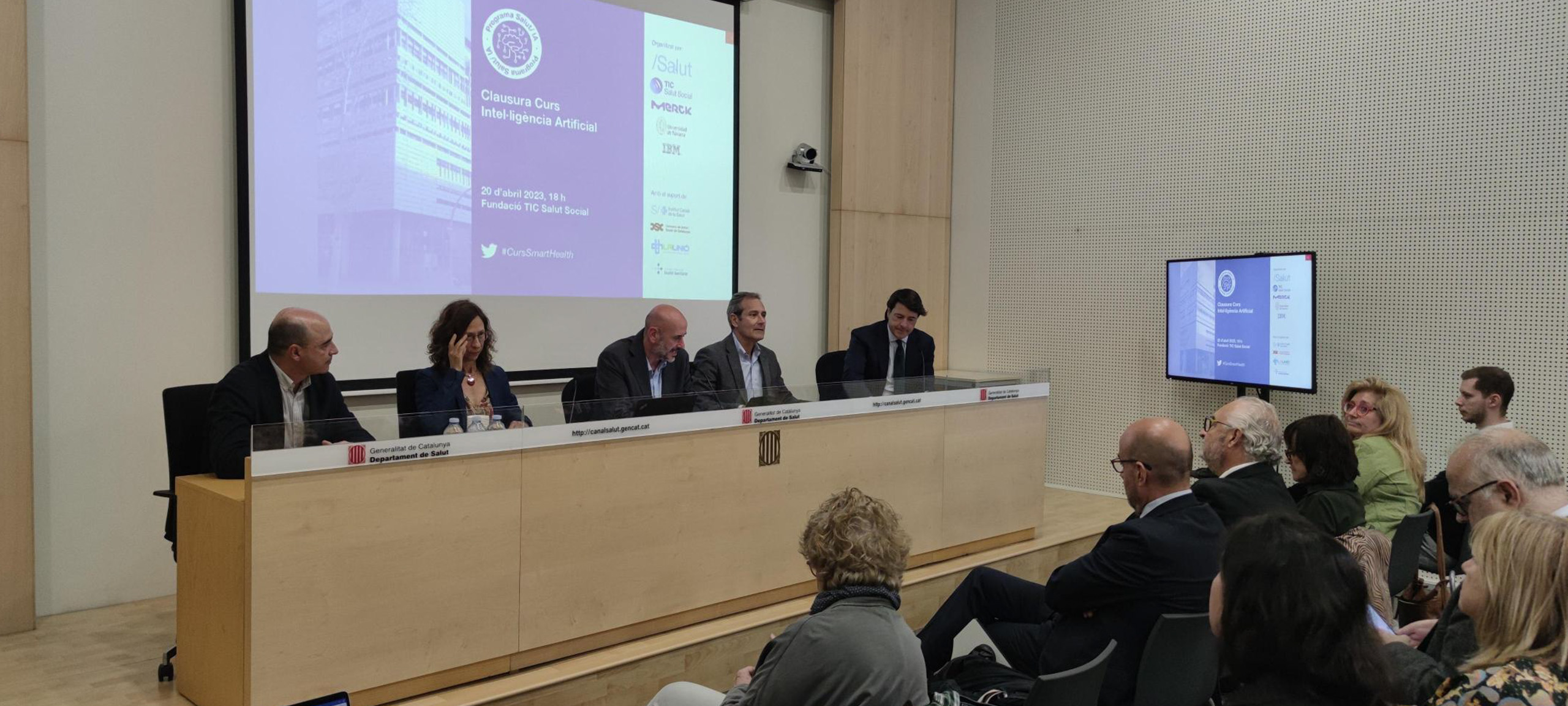More than 190 health professionals in Catalonia complete the Smart Health Awareness course on artificial intelligence and big data
The course’s closing session highlighted the need to coordinate efforts for equitable, reliable and ethical use of artificial intelligence in the Catalan health system.
Students, representatives of the Catalan health system, the Health/AI Programme, Merck, IBM and the Engineering School at the University of Navarra-Tecnun, completed the first Smart Health Awareness Course on artificial intelligence (AI) and big data on 20 April at the TIC Salut Social Foundation in Barcelona. The preliminary data on attendance and assessment of the course were presented at the event. On this first occasion, 190 professionals completed it. They were presented with AI use cases in the field of health, as well as the challenges and opportunities of this technology.
Aina Plaza, the Director General of Health Planning, opened the event and highlighted that “The course is timely because it takes place in an environment with two essential aspects to advance the deployment of AI: the Health System of Catalonia is a leader in terms of the volume of data digitisation and has high-quality IT systems.” Plaza explained that digital health is one of the focal points of the levers for change in the Catalan Health Plan 2021-2025. She emphasised the Health Department’s commitment to AI with the recent launch of the Health/AI programme.
Representatives of the organisations that have jointly organised the course also participated in the opening of the event: Carlos Gallego, Director of the Health/AI Programme; Eduardo San José, Merck National Market Access Manager; Juan Carlos Sánchez, Health Industry Leader at IBM, and Ignacio Nicolás, Director of the Professional Programmes Unit at the University of Navarra.
Presentation of practical cases of AI in health
Gallego moderated the event’s first session in which three reference cases being developed in the field of AI in health were presented: the Health AI Observatory, the INCISIVE European project and the use of AI in dermatology at Hospital Clínic.
First of all, Núria Abdón, the head of the Health/AI Observatory, presented the aims of this initiative. It was launched in 2022 to find out about and spread, in a cross-cutting way, how AI in the field of health is generated, from conceptualisation to implementation. She stressed the risks and the opportunities it creates. Abdón shared the observatory’s latest reports and data. To date it has detected 107 AI algorithms at different degrees of maturity that are being developed in the field of health. It is continuing to collect all this information through the forms provided on its website.
Didier Domínguez, an expert at the Artificial Intelligence Area of the TIC Salut Social Foundation, then presented the challenges of the INCISIVE European project in which 26 partners from all around Europe are working to tackle two major challenges. On the one hand, creating 20 AI algorithms for four types of cancer (breast, lung, colon and prostate) to improve the diagnosis, prognosis and treatment of the disease; and on the other hand, creating a pan-European interoperable federated repository of medical images to allow the secure exchange of data in accordance with the ethical, legal and privacy requirements.
Finally, Marc Combalia set out his experience as Director of Artificial Intelligence in the field of skin cancer at Hospital Clínic in Barcelona. The field took off just 5 years ago with the publication of a scientific article in the prestigious magazine Nature. It now presents great potential and many challenges: AI can become a reliable tool for disease screening, but it also presents possible risks of inaccuracy in patients with scars, professionals’ lack of knowledge of the correct use of the technology, and also lack of regulation in the use of dermatology apps.
Challenges and opportunities for health AI
During the course’s closing session, Pol Pérez, the General Coordinator of ICT in the Catalan Health System, moderated a roundtable on health AI with the participation of José Augusto, Director General of the Health and Social Consortium of Catalonia; Roser Fernández, Director General of the Catalan Hospital Union; Pau López, Head of the Information Systems Technical Office at the Catalan Health Institute, and Ramon Cunillera, President of the Catalan Society of Health Management.
During the discussion they addressed the needs that arise from AI in this area: regulation is required, professionals should be trained in the use of this technology, we need to work towards ethical and reliable use of AI, and public governance should be implemented that is compatible with public-private collaboration, focussing on the needs of the health system and citizens, not industry or large tech companies. The discussion made clear that all stakeholders are willing to coordinate efforts for equitable deployment of AI enabling everyone in Catalonia, both from regions outside Barcelona and from the capital, to have access to the benefits this technology provides.
Joan Guanyabens, the Director of the TIC Salut Social Foundation, closed the event, noting that the Health/AI Programme is the official mechanism to create an enabling environment for innovation in the field of health through the development and implementation of AI solutions to improve citizens’ health. Accordingly, he stressed that “AI has as many risks as benefits” so “if we want to use an algorithm, the public administration must evaluate it with our data before bringing it into the system”.
In closing, Isabel Sánchez, the Medical Director of Merck in Spain, highlighted her company’s role in promoting initiatives such as the Smart Health Awareness course.
About the Smart Health Awareness course
The Smart Health Awareness course is one of areas of work that has been developed within the framework of the Health/AI Programme. Gallego said that, with the launch of this course, “It is critical for professionals in Catalonia to know how AI can be one of the tools that have the power to transform the health system and develop the country’s research.”
In total, the training course involved a total of 25 hours for the students and 22 virtual sessions were held addressing aspects to understand topics such as how machine learning and deep learning algorithms can help to develop predictive models (among other functions) and to learn first-hand about real success cases of the application of AI in health.
More news
-
26 JANUARY 2024

SISCAT and research center managers delve into the field of artificial intelligence in health
About sixty managers and senior representatives from the centers of the Catalan public healthcare ...
26 JANUARY 2024 -
20 OCTOBER 2023

The results of the preliminary market consultation for the medicine information challenge have been published
The Health Quality and Assessment Agency of Catalonia (AQuAS) has published the Final report ...
20 OCTOBER 2023 -
19 JULY 2023

The Department of Health begins the market consultation process for the development of AI-based solutions to provide information on medicines to the public
Within the framework of the Health/AI programme, the conditions of the market consultation concerning ...
19 JULY 2023



